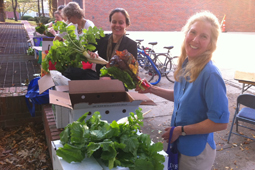Buy a crop share, reap fresh produce
Partnership with Warner Farm brings community supported agriculture to campus
 Photo/Janna Cohen-Rosenthal
Photo/Janna Cohen-RosenthalSarah Lamb, anthropology department chair, left, picks up farm share with Laurel Carpenter, anthropology department administrator
You don’t have to pick your own or hit up a farmer’s market to get produce straight off the vine. The community supported agriculture movement enables members to buy part of a farm’s crop before it has even sprouted, assuring fresh produce every week of the growing season.
Members of the Brandeis community can take advantage of a partnership with Warner Farm and sign up for a share. The 20-week membership runs from June through October and the eight-week share runs from September through October. Produce is chosen for you according to what’s ripe, then boxed and delivered to campus. Tentative pick-up location for this year is the Spingold Theater lawn, Tuesdays from 2 to 6 p.m.
By investing up-front, members are showing support for local farmers by helping to finance the production process, which lessens some of the burden on small, family-owned farmers like Warner.
 |
|
Alternative Spring Break: Urban Agriculture and Food Justice Like to spend spring break building a healthy community and promoting a sustainable food system in an urban environment? Brandeis Hillel is offering “Urban Agriculture and Food Justice Alternate Break.” This new program is in conjunction with the Jewish Farm School’s newest partner, Mill Creek Farm, in western Philadelphia. |
 |
“The demand for local food has really ramped up over the past four to five years,” says Mike Wissemann, owner of the Sunderland, Massachusetts-based farm. “It’s really consumer-driven.”
The idea for the Brandeis-based community supported agriculture program began when Janna Cohen-Rosenthal, Brandeis’ sustainability coordinator, met an agriculture student at a sustainability conference who suggested a collaboration with Warner Farm.
Because student groups such as the NaturaLiving Club and Students for Environmental Action and associate professor Sabine von Mering, an active member of the Brandeis campus sustainability movement, were enthusiastic, Cohen-Rosenthal said, “I thought it could be viable to launch quickly.”
Four weeks after connecting with Warner Farm, the program was in place -- but Warner Farm needed to pre-sell at least 50 shares to make it worthwhile. They sold around 90 with very little advertising.
“It’s a wonderful thing to have people committed to buying your product,” says Wissmann. “Sure, it puts the pressure on us to produce, but that’s okay -- growing is certainly challenging, but selling is even more challenging.”
Competing with large-scale growers and supermarkets is one of the most difficult aspects of farming; selling in quantity is cheaper, but often lacks quality. Locally grown produce travels ripe from farm to plate, without being picked prematurely to ripen in transit. Cost of a share is often less expensive than fresh fruits and vegetables of equal quality.
“What upsets me is that stores don't have to tell you how far your produce has travelled from where it was grown,” says von Mering, associate professor of German and Women's and Gender Studies, and director of the Center for German and European Studies. “Think about it: You buy organic apples from New Zealand supposedly to avoid chemicals in your food, and in order to get them here they burn tons of jet fuel into the atmosphere. I love the idea that my produce was grown in Massachusetts by people who pay their taxes here and who care about sustainable agriculture.”
Many people who participated in the program last year, when it was initially offered, say that because the farm selected the vegetables, they tried things they wouldn’t have otherwise and became fans.
For example Sarah Lamb, chair of the anthropology department, says she’s learned about daikon radish greens and the various winter squashes, which she now bakes and serves with red quinoa and melted cheese. Aileen O’Rourke, of the Office of Development and Alumni Relations can now tell the difference between a kuri squash, delicata squash and spaghetti squash and two types of kale.
“I started putting rainbow chard in my omelets in the morning as a substitute for spinach,” says O’Rourke.
For the past ten generations, the 150-acre Warner Farm has been practicing a number of sustainable methods to promote fertile soil, such as crop rotation and taking part in a zone tillage program that alleviates weed pressure, keeps nutrients in the soil, prevents soil erosion, improves field drainage and reduces the use of fossil fuels.
There are 17 acres in certified organic production and additional fields that are currently in the three-year transition period to organic certification by the U.S. Department of Agriculture.
In its non-organic fields the farm uses an integrated pest management program that looks to methods other than pesticides for crop management. This includes encouraging insects that eat other insects and using insect growth regulators and pheromones, which disrupt the mating of pests.
For more information email Warner Farm or sign up for a share.
Categories: General, Student Life






